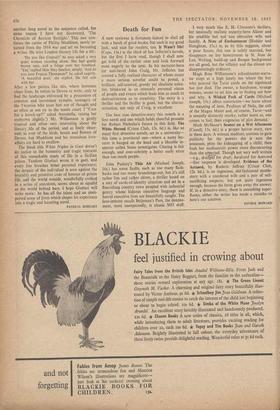Death for Fun
A NEW reviewer is fortunate indeed to start off with a batch of good books, but such is my good luck, and nice for readers, too. It Wasn't Me! (Cape, 15s.) is the third of Ian Jefferies's novels, but the first I have read, though I shall now get hold of the earlier ones and look forward most eagerly to the next. In his narrator-hero (or anti-hero) John Craig, Mr. Jefferies has created a fully realised character of whom many a more serious novelist could be proud, a brilliant, self-centred, greedy yet idealistic scien- tist, blinkered in an intensely personal vision of people and events which leads him as much to destructiveness as to creativity. The story is a thriller and the thriller is good, but the charac- terisation, not only of Craig, is excellent.
The best true detective-story this month is a first novel and one which holds cheerful promise for Robert Nicholas's future in this field. The White Shroud (Crime Club, 12s. 6d.) is, like so many first detective novels, set in a university— this time a provincial one—where a nasty lec- turer is banged on the head and a likeable in- spector called Stone investigates. Clueing is fair enough, and over-sobriety a better early error than too much purple.
John Pudney's Thin Air (Michael Joseph, 16s.) has some faults, such as too many flash- backs and too many branchings-out, but it's still rather fun and rather clever, a thriller based on a sort of cards-of-identity situation and set in a flourishing country town peopled with industrial gentry whose hideous executive language and horrid executive lives are beautifully caught. The love-interest recalls Betjeman's Pam, the denoue- ment, most unexpectedly, is classic MI5 stuff. I very much like E. H. Clements's thrillers, her unusually realistic security-hero Mister and his credible but not too obtrusive wife and family. A Note of Enchantment (Hodder and Stoughton, 15s.) is, as its title suggests, about a poor Susan; this one is safely married, but disappears on her honeymoon in St. Jean de Luz. Writing, build-up and Basque background are all good, but the villainy and the climax are disappointingly ordinary.
Hugh Ross Williamson's schoolmaster-narra- tor stops at a high lonely inn where the boy who painted the Tarot cards on the signboard has just died. The owner, a handsome, strange woman, seems to set him on to finding out how and why. A Wicked Pack of Cards (Michael Joseph, 15s.) offers esotericism—we learn about the meaning of love, Paulinus of Nola, the cult of the Magna Mater and, of course, Tarot—and is sexually distinctly murky, rather more so, one comes to feel, than exigencies of plot demand.
Mark McShane's Seance on a Wet Afternoon (Cassell, 13s. 6d.) is a proper horror story, rare in these days. A woman medium, anxious to gain publicity for the powers she is sure she possesses, plots the kidnapping of a child, then finds her mediumistic power more disconcerting than she eitpected. Though not very well written —e.g., draretifor draft, hardcord for haircord —fine suspense is developed. Evidence of the Accused, by Roderic Jeffries (Crime Club, 12s. 6d.), is an ingenious, old-fashioned puzzle- story with a murdered wife and a pair of self- sacrificing suspects; but not quite ingenious enough, because the form gives away the answer. If, in a detective-story, there is something super- fluous, either the writer has made a mistake or here's our solution.
ESTHER HOWARD










































 Previous page
Previous page